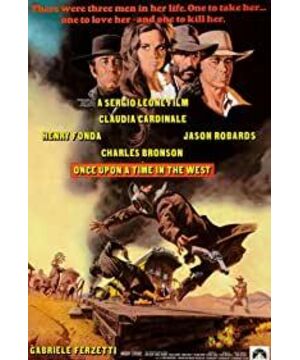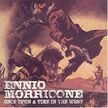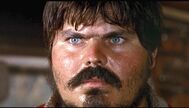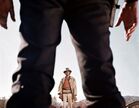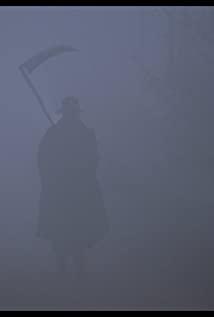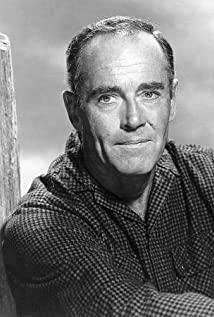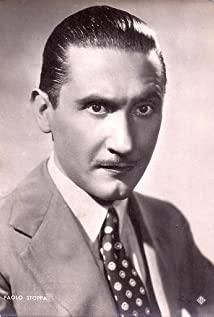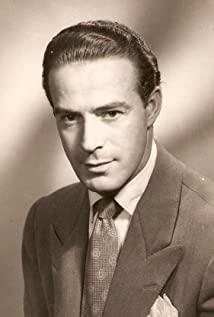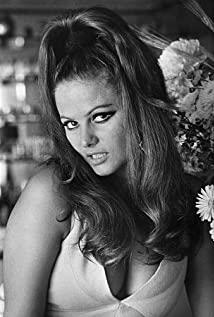But despite this, he can no longer treat this film as a normal western. He has reached a new stage of creation, and he can never be satisfied with repeating the subject matter he has photographed. His luck lies in the fact that he has three successful works on hand, and he can get a huge investment to make this epic film with the title of Western film; his unfortunate is that his first three works are too successful, so he is destined to The film was made in an eclectic way.
The story clues of this film are rather messy, not as tightly plot and clear as normal westerns. It tells that the lame Morton took aim at a piece of land in the wild mountains of the Great West in the United States, so he and Frank, the cowboy bandit played by Henry Fonda, together thought to seize the land, and Frank directly killed the Irish family. Lost. Suddenly a girl named Jill came from New Orleans at this time. She was the fiancée of the Irishman. As a result, the Irish land was returned to Jill. At this time Frank and Lame Morton began to have friction, and a stray gunner came straight towards Frank inexplicably. In addition, because Frank pretended to be a gang of gangsters headed by Sean when he committed the crime, he angered Sean. Next, Frank caught the stray gunman, but then he was rescued by Sean; Frank caught Jill again, and Jill seduced Frank, and promised to auction the Irish land for Frank to take it; Frank was still under house arrest with the lame Morton, but he Morton's men are bought out by Morton, who plots to betray Frank. At the auction house, due to the sudden intervention of the stray gunner and Sean, the Irish land was eventually photographed by the stray gunner. Frank asked the stray gunman for that piece of land, but was rejected. At this time, the lame Morton's subordinates rushed to assassinate Frank, but they were stopped by the stray gunman. Xia En went to find the lame Morton to settle the account, and both lost. In the end, the land that everyone seized went to Jill. Frank and the stray gunner fight in a cowboy manner, and Frank dies. Sean came back with a gunshot wound to meet Jill and the wandering gunman for the last time, and died. Jill built a train station on that piece of land according to his late husband's wishes. The wandering gunman refused her favor and left alone.
It must be said that if you understand this film in the way of understanding the "Funker Trilogy", what you get is the above, the struggle for property, grievances and hatreds between people. But as I said earlier, Sergio Leon doesn't want to make western films anymore, he wants to make epic films. Therefore, what he really pays attention to is not the fate of the characters, but the fate of the times. What he wants to describe is the end of an old era and the advent of a new era. How did he express this grand theme through the story lines above? It must be regretted to say that since he was very literary and filmed the film for more than four hours, and then the film dealer cut half of it utilitarianly, and the cut was exactly those parts that he had aspirations, so it was complete. The version is no longer visible. Including the version I watched, what can be downloaded online is a two-and-a-half-hour reduced version. In contrast, "Once Upon a Time in America" in 1984 finally faithfully implemented his epic ambitions.
The following content is not a film review, but just to pick up the epic fragments that are left after the film has been deleted, for everyone to sigh.
Let me first introduce the background of the times in the film. At that time, the United States was undergoing the development of the West. Barren mountains, wild lands, and cowboys were about to withdraw from the stage of the times and were replaced by high-rise buildings. The railway should be spread to the west to promote the construction of the west and the flow of population. At this important juncture of the changes of the times, only two far-sighted people in the film saw the huge business opportunities. No matter which of them succeeds, they will surely become the big chaebols who will dominate the United States from now on. These two people are the dead Irishman and the lame Morton. Unlike the most powerful cowboys in the film, they are the ones who see the future. But in order to fight for a piece of wasteland that everyone seemed worthless, they all lost their lives. The main reason for this is probably because they are too ignorant of the traditional western values and the behavioral principles of cowboys that are going to the end.
Not long after the opening, when Frank talked to the lame Morton once, he ridiculed his broken leg and still lived like an ordinary person, without showing any shame or depression. At this time Morton was scolding Frank for killing the Irishman, blaming him for his bravery, robbery and hooligans. It can be seen that Frank believes that men who do big things should be galloping the world, dare to do things, do whatever they want, and use their own power to win what they want. Morton is obviously already a modern businessman. For him, pursuing wealth is nothing more than operating a business, not a robber. How does his ability to walk affect his business?
In fact, the contradiction between Frank and Morton is not the main contradiction in the film for viewers who are accustomed to traditional westerns. It is just a sideline episode of the bad guys who are against the black and eat the black. The feud between the wandering gunner and Frank is the main line of the film. But Sergio Leon obviously didn't think so. What he aspires to express is that under the tremendous changes in the value of the times, people of different identities and stances have suffered different fate: some have been stunned for a while, but they have no choice but to face the elimination of the times; some have not yet grown, but undoubtedly Will occupy the future. Therefore, compared with the old rivals of Frank and the Wandering Gunners, which have to be resolved in a cowboy style, Sergio León is more concerned about Frank, who represents the traditional values of the West, and the lame who represents the new values. The conflict between Morton. Unfortunately, in order to pursue a more prominent showdown between good and evil, a shorter film length, and a more refreshing story of revenge, the incomprehensible film business cuts out the content of the film precisely about the lame Morton pursuing the individual with the method of a businessman. The content of value, and the resulting conflict with Frank. Understand this, there will be no more questions such as why Henry Fonda was allowed to play the opposite angle. Because this film has no contradictions in Sergio Leon's eyes. He equally loves these sadly destined characters, and then expresses the sorrow of the changes of the times.
The next plot of the film confirms this point. Frank, generally considered the last big boss of the enemy, should be insidious and powerful from beginning to end in similar movies, and the non-protagonist cannot be defeated. But the actual situation is that when he was ambushed by several former subordinates bought by Lame Morton, he looked embarrassed, and there was no such thing as a big demon who easily cleaned up the small supporting role. And his old enemy, who is generally believed to be the first male protagonist in the film, the wandering gunman, surprisingly helped him at this time.
When I watched the film, I didn't understand why the stray gunman saved him. It stands to reason that Frank has a bloody feud with him, and he should take the opportunity to kill Frank. At that time, I came up with two reasons to explain: 1. He was too confident and showed a gentleman's demeanor. He had to defeat Frank not only physically, but also mentally; 2. He and Frank hated him too deeply and must kill each other with his own hands. In order to vent their anger, so do not allow others to intervene. But now I think both explanations are wrong, because the wandering gunner’s expression and what he said later do not support these views.
I think that the stray gunman rescued Frank because although he and Frank had a bloody feud, after all, both of them lived under the values of the Old West, and these hatreds were resolved in a Western way. The attack on Frank by the lame Morton at this time was an intervention by the outside world on the Western Law. In other words, in the bones, the wandering gunner and Frank are the same kind of people, and the lame Morton is an outsider. Therefore, out of emotional recognition and respect for the traditional values of the Old West that nurtures and nurtures him, the wandering gunman cannot accept that Frank will be solved by a standard businessman in a developed eastern region with money in front of him. The loneliness in his eyes is actually Frank's loneliness. The world they are familiar with will soon be sealed into history, and the bell of the new world has already sounded. They only know how to act according to the old-fashioned cowboy guidelines. Frank, who tried to integrate into the new world, was frustrated, and Shane, who adhered to the principle, died tragically under Morton's gun. Their fate has been pronounced. When the high-rise buildings in the small town are built and the modern and civilized lifestyle invades, they will have no place to stand. Because the film was severely edited, when the two men meet in a small town at the end of the film, the audience will hear an unexplained dialogue. Frank said: Morton once said that I would never become like him. Now I can understand, and I can feel my roots if I don't mix with him. The wandering gunman said: Have you finally found out that you can't be a businessman? Frank said: I can only be a man. The wandering gunman added: He came alive from ancient times. How much bitterness is involved in these simple conversations.
Finally, these two end-of-the-road cowboys finally ushered in a cowboy-style duel commonly seen in "The Red Dead Trilogy". Frank lost his life, and the wandering gunman lost his world.
As the picture turned, the Irish wasteland was taken over by Gill, a long-sleeved dance girl who moved from the eastern developed areas. Railway stations, churches, schools, banks, department stores were built in full swing... and soon. A whole new world will rise. It should be admitted that this woman Jill has no right and wrong, no matter who wins the duel between Frank and the wandering gunman, she will accompany the winner. And this is the character traits of the businessman in the next stage of primitive accumulation of capitalism: there are no permanent friends, no permanent enemies, only permanent interests. Facing her retention, the wandering gunman turned and left without hesitation. Although he could not defend the old world he lived in, at least he got a decent exit. After his lonely figure, the heavy iron gates of the Old West slowly closed under the force of historical hinges.
View more about Once Upon a Time in the West reviews


